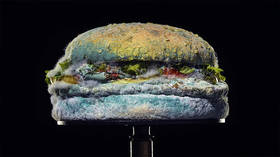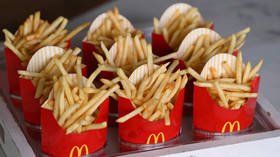Make no mistake: Burger King’s vaunted ‘real food’ burger without additives will still KILL YOU

Burger King is the latest fast food brand trying to distract from its role in growing our waistlines, by virtue-signaling about what’s not in its food. But all the misdirection in the world can’t spare it a nutritional reckoning.
The chain unveiled an ad earlier this week, showing time-lapse footage of a Whopper growing moldy over a month to tout the removal of artificial preservatives from its signature item.
With health-conscious consumers shying away from the unchecked gluttony Burger King and its ilk once celebrated – remember the Carl’s Jr. “thickburger,” the cheeseburger that somehow included a hot dog and potato chips in the burger, and KFC’s “DoubleDown,” the bacon and cheese sandwich in which fried chicken is used instead of bread? – fast-food chains are having an existential crisis.
Ads like this are designed to misdirect, to make the consumer feel virtuous for choosing Burger King while distracting them from the fact that they’re still eating a fat- and cholesterol-heavy slab of processed meat and probably washing it down with a tub of high-fructose corn syrup, taking one more step toward joining the 71 percent of Americans who are overweight. While a Whopper has “only” about 660 calories, that’s still more than a fourth of what the average adult requires daily, and it doesn’t include the fries and soda. The combination of high fat, high cholesterol and sugar is especially deadly in a country where heart disease is among the top three killers.
Burger King isn’t the first to use getting rid of preservatives as a selling point – rival McDonalds dropped artificial additives back in 2018, though the issue was probably more personal for them, given the 12-year-old McDonalds burger, kept under glass in Iceland, which has not decomposed since the chain’s last location in that country closed. The Burger That Wouldn’t Die has become a popular reference point for writers penning jeremiads on consumerism, capitalism, or, well, fast food.
Indeed, Burger King’s arch-enemy is miles ahead of it in virtue-signaling, having grasped the profit possibilities of climate change early on. While Burger King’s environmental record is said to be abysmal, McDonalds has been shouting its green cred to the skies since at least 2014, when it set public “sustainability goals” for 2020. Any fast food chain that actually follows through on its green patter deserves some praise, but that doesn’t make their food, or the people who eat it, healthy – or mean they’re saving the planet.The distraction doesn’t even have to be food-related – Burger King has released patently offensive ads that have nothing to do with food in the past few years, in a seemingly desperate attempt to focus attention on something other than the nutritional disasters on its menu. Whether it’s the “Blue Meal” – “because no one is happy all the time,” went the play on rival McDonald’s ubiquitous ‘happy meal’, a campaign that was excoriated by mental health advocates – or the campaign in Russia that used a meme mocking an alleged rape victim to advertise a limited-time offer, Burger King has cashed in on what the advertising press has euphemistically called“edgy” campaigns and successfully kept the conversation off calories and cholesterol.
Also on rt.com Burger King Russia used rape victim's likeness in social media adWhen the chain has made concessions to health, as in the case of the much-hyped meatless “Impossible Whopper,” they are always framed as something else, so as not to reflect negatively on the less-healthy menu options. Burger King rolled out the plant-based Impossible Burger last year, but the marketing for this “Tesla of burgers,” as CNET irritatingly called it, ignores health completely and focuses on taste (with a side of techno-fetishism).
Indeed, the ad actually throws shade at “other” veggie burgers by implying that Impossible’s virtue is that it doesn’t taste like such inferior products. No comparison is made between the nutritional value of the Impossible burger and its beef brother, and this is logical enough - admitting that the “regular” Whopper is unhealthy would be brand suicide. Besides, the Impossible Burger isn’t as healthy as Burger King might want its customers to think, coming in at 630 calories fully loaded with mayo and toppings - just a little bit better than the beef version.
Burger King’s predicament is difficult – ‘fast food’ is, by definition, the opposite of the locally-sourced, environmentally-sound trends in vogue in 2020 - but the chain’s sales don’t seem to be suffering. The company’s CEO claims to be “all-in” on plant-based foods after the encouraging performance of the Impossible Burger, though lagging sales forced stores to cut the price to bring it in line with cheaper menu items. But the chain’s success even as a throwback to the days before health-conscious consumption was de rigueur makes sense, given the reason fast food became such a phenomenon in the first place - it’s cheap and ubiquitous. Back in 2017, fast food sales were actually growing faster than the US economy as a whole, but only on the low end, suggesting the growth was need-driven rather than a reflection of taste.
Given that those suffering the most from the obesity crisis in the US aren’t the rich, it’s encouraging that Burger King at least feels a little bit guilty about the artery-clogging slop it’s fobbing off on the poor – even if that guilt is only born out of a sense of self-preservation. Removing synthetic additives is an encouraging step, and a long-overdue one, but with nearly two in five American adults now classed as not merely overweight but obese, there’s no time like the present to start getting serious about serving healthier food.
Think your friends would be interested? Share this story!
The statements, views and opinions expressed in this column are solely those of the author and do not necessarily represent those of RT.















